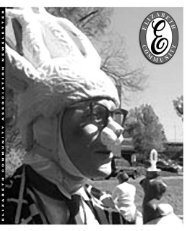Spring - Elizabeth Community
Spring - Elizabeth Community
Spring - Elizabeth Community
Create successful ePaper yourself
Turn your PDF publications into a flip-book with our unique Google optimized e-Paper software.
more. Start your day with a<br />
heartfelt smile and a joyful<br />
hello to every person you meet.<br />
Have a daily calendar on your<br />
desk with words of wisdom that<br />
will inspire you. Here’s one<br />
from African Villages Calendar:<br />
“Your smile is an open window<br />
which tells people you are<br />
inside the house”.<br />
When making up your to do list<br />
for the day be sure to set aside<br />
15 minutes for a walk outside.<br />
We are so fortunate to have<br />
Independence Park right in our<br />
neighborhood. Researchers tell<br />
us we need only 15 minutes<br />
of sunlight daily to fulfill our<br />
Vitamin D requirement. So<br />
when the sun is out, walk<br />
outside and see how much<br />
better you’ll feel.<br />
Look at your inside<br />
environment. Is it organized<br />
Is your desk clear Take time<br />
alone, with a friend, or with a<br />
professional organizer, putting<br />
your office in order. A good<br />
practice is to spend the last<br />
15 minutes of the day clearing<br />
your desk and setting up for the<br />
next day. Writing a to do list for<br />
tomorrow will help start your<br />
day off with a smile and leave<br />
you feeling lighter as you end<br />
your day.<br />
Have only one picture of family<br />
in your office, preferably not<br />
on your desk. Put as much as<br />
possible in your desk draws to<br />
keep the desk surface clear. Do<br />
have a plant to supply oxygen<br />
near your window. If you don’t<br />
have a window, let your plant<br />
vacation in someone’s office<br />
every weekend. Be sure to set a<br />
day or two each week to water<br />
the plant. Always have fresh<br />
water available for you to sip.<br />
At lunchtime, go somewhere<br />
with a co-worker and enjoy<br />
your lunch in a relaxed<br />
atmosphere. You’ll find getting<br />
away from your desk really<br />
photo by Nancy Albert<br />
helps lighten the day. Bring<br />
fruit to have during breaks so<br />
you’ll be picked up naturally<br />
and you’ll avoid resorting to<br />
the vending machines.<br />
For those long drawn-out<br />
meetings, volunteer to write<br />
the agenda. Somewhere on the<br />
agenda sheet write a humorous<br />
saying and watch people react<br />
to it. Not only will the meeting<br />
go faster, but all might enjoy<br />
participating more.<br />
If you have a long project with<br />
many parts, reward yourself<br />
after each section is completed.<br />
Make the reward something<br />
simple and immediate like a<br />
10-minute meditation or a<br />
second walk outside.<br />
Look for ways to help coworkers<br />
and see how much<br />
easier the day goes. Come to<br />
work with gratefulness and see<br />
how much lighter you’ll feel.<br />
Frances D’Amato is an <strong>Elizabeth</strong><br />
<strong>Community</strong> resident and an<br />
organizational psychologist who helps<br />
neighbors keep clutter free.<br />
Topics on Trees:<br />
cankerworm update<br />
by Kara Gooding<br />
By the time this newsletter is<br />
delivered to you, it will almost<br />
be time for the cankerworms<br />
to hatch. If you banded your<br />
trees and your neighbors<br />
banded their trees as well, your<br />
efforts, combined with the city’s<br />
spraying program will have<br />
protected our gorgeous canopy<br />
for more years to come.<br />
What happens<br />
in the spring<br />
Usually the worms hatch in<br />
late March when they eat their<br />
way through the tree canopies<br />
and then drop on silky threads<br />
down into the ground. But with<br />
the drought and the strange<br />
weather patterns this winter,<br />
it could be earlier or later<br />
than March when they appear.<br />
Whenever they do begin to<br />
hatch, it is important to keep<br />
the tree bands up until after<br />
all the worms have dropped.<br />
This is because several will get<br />
caught in the bands as they<br />
make their way to the ground.<br />
The less worms that make it<br />
into the ground, the fewer<br />
moths you will need to trap the<br />
next fall. Once the worms are<br />
done dropping, it is important<br />
remove the bands. Bands tend<br />
to hold moisture up against the<br />
tree bark and should NOT stay<br />
up all year long.<br />
The city spraying campaign<br />
This year, the city has<br />
committed to spending<br />
$2.6 million dollars on<br />
aerial spraying of Bacillus<br />
thuringiensis, or Bt. The<br />
targeted area for the aerial<br />
spraying is about 73,000<br />
acres and contains an<br />
estimated 365,000 trees. Bt<br />
is a naturally occurring, biorational<br />
insecticide that is<br />
safe for humans and pets. It<br />
is commonly used by organic<br />
farmers and bee keepers today.<br />
Because Bt is effective for a<br />
48-hour window, Charlotte<br />
neighborhoods will be sprayed<br />
only when the worms in those<br />
areas are actively hatching.<br />
Not all neighborhoods will be<br />
sprayed at the same time.<br />
Why spraying is so<br />
important<br />
Last year’s infestation was so<br />
bad that 92% of Charlotte’s<br />
traps exceeded what the USDA<br />
and Forest Service considers<br />
a “high” infestation rate. The<br />
Forest Service defines a high<br />
infestation as any trap that has<br />
90 or more bugs in it. Several<br />
traps in the Charlotte area<br />
last year had +/- 3,000 bugs<br />
ensnared in them and this year<br />
looks to be tracking along the<br />
same numbers. While banding<br />
protects trees, spraying is the<br />
most effective method for the<br />
city to eradicate the infestation<br />
permanently.<br />
Questions or comments, please<br />
email trees4elizabeth@gmail.<br />
com. Thank you to everyone in<br />
<strong>Elizabeth</strong> who banded trees.<br />
Now, if we could just make it<br />
rain…<br />
Tough year takes toll<br />
on city’s trees<br />
by John Albert<br />
Even if you read The Charlotte<br />
Observer on January 13, the<br />
article by David Perlmutt and<br />
Bruce Henderson is worth our<br />
repeating. The following are<br />
extractions from that article.<br />
“Last year was tough on trees<br />
in the Charlotte region.<br />
The continuing assault by<br />
development was aggravated in<br />
6 the people pages the people pages 7







